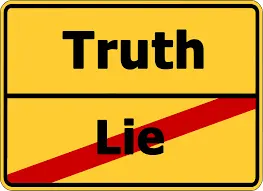A lie, whether a slight one or a big one, can get deeply rooted. Over time, it destroys trust, relationships and confidence. It’s hard to snatch lies out of our heads, but we can with conscious effort. This will provide you with a step-by-step strategy for overcoming lying once and for all.
Table of Contents
Understanding Why People Lie
To stop lying, you need to figure out why you’re lying. The reasons people lie are different:
- Avoiding Consequences: Being scared of getting caught or facing consequences makes one lie.
- Self-Preservation: One can tell lies to save your ego or your reputation.
- Social Acceptance: Lying in order to fit in, to impress or to avoid rejection.
- Habitual Lying: Over time, lying becomes habitual, usually without intent.
Reviewing why you lie will help to expose the problems and resolve them.
Recognizing the Consequences of Lying
It is easy to lie when you need to, but the long-term results can be devastating:
- Broken Trust: You need to be honest with one another. Lies, when exposed, generate distrust that takes years to recover.
- Emotional Toll: Keeping track of lies is exhausting and generates anxiety, guilt and shame.
- Reputation Damage: A lifetime of dishonesty destroys your reputation.
- Personal Growth Stagnation: Lies create a fake picture of yourself and are a block to improvement.
Realizing these implications can give you more motivation to act.
Steps to Stop Lying
To quit lying takes reflection, action, and responsibility.
1. Commit to Change
It all starts with an absolute determination to be transparent. Identify your reasons for quitting lying and make a note of them. For example:
- Rebuilding trust with loved ones.
- Reducing anxiety and guilt.
- Living authentically and aligned with your values.
This promise becomes your lifeline when temptation arises.
2. Identify Your Triggers
Consider the circumstances that drive you to lie. Common triggers include:
- Stressful or high-pressure environments.
- Fear of judgment or rejection.
- Those moments where you don’t feel good enough or ready.
If you find these triggers, create alternative responses. For example, instead of lying to avoid embarrassing yourself, practice saying, “I don’t know anything about this but I will try to know for you”.
3. Develop a Habit of Self-Awareness
Lying can happen instinctively, without conscious awareness. To counter this, cultivate mindfulness:
- Pause Before Speaking: Pause before saying anything to see if what you’re about to say is true.
- Reflect on Past Lies: Journaling can help you identify the patterns and impulsiveness behind your dishonesty.
- Practice Honesty in Small Ways: Begin by attempting small challenges where you have very little at stake, gradually building up your honesty muscle.
4. Practice Radical Honesty
Radical honesty means telling the truth when it hurts. It doesn’t mean being violently direct, it means being yourself:
- Instead of saying all the time, “I’m fine,” when you’re actually not fine, always try to say, “I’m having a difficult day.”
- Make sure you apologize when you get things wrong. For example. “I didn’t finish the project on time, and that’s my fault”,
In the long run, honesty will become less daunting and easier to accomplish.
5. Address Underlying Issues
Lying is often a sign of an underlying emotional or psychological challenge. Handling these will reduce the drive to tell a lie:
- Therapy: You can talk to a counsellor about issues such as low self-esteem, anxiety, or undiagnosed trauma that leads to lying.
- Self-Help Resources: Books, podcasts, or workshops about honesty and integrity can give you valuable insights and resources.
Once you’ve healed those underlying issues, you’ll be in a much better position to construct an honest life.
6. Build Accountability Systems
Support can help you stay motivated:
- Enlist a Trusted Friend or Partner: Tell them you’re doing this because you’re sick of lying and ask them to gently correct you if they see you’re lying.
- Track Your Progress: Keep a journal of your successes and failures. Celebrate small victories to keep yourself motivated.
- Set Consequences for Lying: If you lie, then promise to apologise and rectify the mistake immediately.
Accountability keeps you on track and committed to your goal.
7. Replace Lying with Positive Habits
When you feel the urge to lie, focus your energy on healthy activities:
- Pause and Breathe: It allows you to respond truthfully rather than impulsively.
- Use Assertive Communication: If you’re nervous about confrontation, practice communicating your requirements and boundaries directly but respectfully.
- Reframe Negative Thoughts: Instead of thinking, “I’ll get caught if I tell the truth,” focus on what will you get for honesty, like gaining respect and peace of mind.
8. Learn to Apologize for Lies
If you make the mistake, admit the lie and apologize as soon as possible. A sincere apology includes:
- Admitting the lie without excuses.
- Expressing regret and understanding the harm caused.
- Committing to truthfulness moving forward.
Apologizing demonstrates accountability and rebuilds trust over time.
9. Embrace Vulnerability
Lying often comes out of a fear of being perceived as false. To be vulnerable is to accept and show your flaws:
- Believe that we all make mistakes, and admitting those mistakes is not a weakness but a strength.
- Join a community of people who care more about realness than perfection.
By being vulnerable, you remove the temptation to cheat.
10. Reward Yourself for Progress
It takes time and effort to break long-term habits. Celebrate milestones to stay motivated:
- Give yourself a reward when you achieve something, such as a favourite food, outdoor activity or present.
- Consider how being truthful has strengthened your relationships and self-worth.
Positive reinforcement keeps the process fun and sustainable.
The Long-Term Benefits of Honesty
Once you set your sights on a true life, it will change your life in radical ways:
- Stronger Relationships: Being truthful builds trust and improves your relationship with others.
- Improved Self-Esteem: Being true to yourself enhances your confidence and self-esteem.
- Inner Peace: When you are no longer burdened by lies, your mind becomes peaceful and clear.
- Personal Growth: Speaking honestly with yourself and others allows for genuine self-betterment.
These advantages affirm your dedication and encourage growth.
Overcoming Setbacks
It’s alright to make mistakes along the road to change. When setbacks occur:
- Reflect Without Judgment: Figure out what led to the lie, and how you can handle it next time.
- Reaffirm Your Commitment: Ask yourself why you want to quit lying and re-enforce your objectives.
- Seek Support: Ask your accountability partner or therapist for support and advice.
Every failure is an opportunity to learn and get better at being honest.
Quitting lying is an act of self-discovery, courage and change. Through knowing your triggers, mindfulness, and being vulnerable, you can live a life of integrity and authenticity. The journey might be painful, but the payoff in healthier relationships, more peace, and personal development is well worth it.
Adopt truthfulness today and watch honesty become not only a routine but also a lifestyle.













